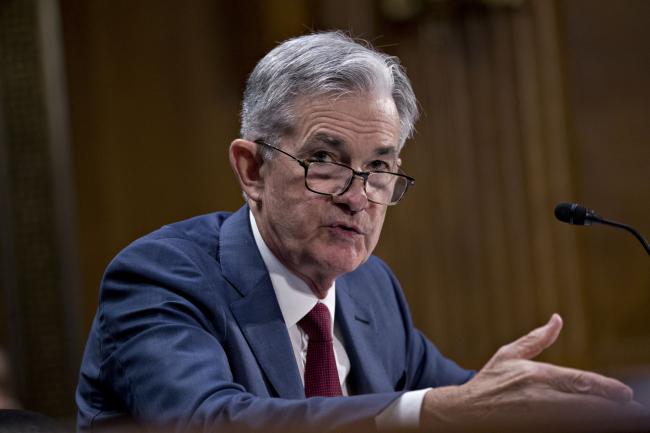(Bloomberg) -- Federal Reserve Chairman Jerome Powell is starting to sound a bit like he’s the world’s central banker.
In Congressional testimony this week, he repeatedly cited a slower global economic expansion in laying out the case for easier U.S. monetary policy.
“There’s something going on with the growth around the world, particularly around manufacturing and investment and trade,” he told the House Financial Services Committee on Wednesday as he all but promised an interest-rate cut at the end of this month.
Powell is not merely being altruistic. As he himself said, the international slowdown and heightened trade tensions are weighing on the domestic outlook.
And with other major central banks running short of monetary ammunition, that arguably places more of an onus on the Fed to support the economy worldwide to prevent it from dragging down the U.S.
“There are limited tools available in the global central-bank community, putting the spotlight on the Fed to ease and underpin global growth and financial conditions,” Bank of America (NYSE:BAC) economist Michelle Meyer and her colleagues wrote in a July 10 note.
In one sense, Powell is just trying to undo the damage President Donald Trump’s trade policies have caused for the world economy. Trump’s tariffs -- realized and threatened -- have prompted multinational corporations to put off capital-spending plans, dampening global growth.
This isn’t the first time the Fed has shifted its stance in response to changes outside the U.S. In 2016, it scaled back plans to increase rates as an abrupt decline in China’s currency shook international financial markets. And in 1998, it cut rates three times in rapid-fire succession as Russia’s debt default rocked the world economy.
Dominant Role
Indeed, the Fed has long had a dominant role in global central banking, as Vice Chairman Richard Clarida noted recently. One thing that’s different now is the diverging performances of major nations.
“What’s a little bit unusual this time is the U.S. is much closer to where it wants to be in terms of both employment and inflation than are other major economies,” Clarida said in a June 21 Bloomberg Television interview.
The result: The Fed, with interest rates close to 2.5%, has much more leeway to promote growth than either the Bank of Japan or the European Central Bank; both have negative rates.
In his interview, Clarida pointed to something else that has changed in recent years, namely, “a much more globalized capital market.”
This means the U.S. is more affected by developments abroad than a mere toting up of its exports and imports would suggest. That exposure comes through the ups and downs of the world’s financial markets as investors move trillions of dollars around the globe -- and the knock-on effects those market moves can have on the domestic economy.
“The Fed is increasingly thinking outside the U.S. toward global financial conditions,” said Jim Caron, fixed-income portfolio manager at Morgan Stanley (NYSE:MS) Investment Management, who forecasts a 50 basis point Fed rate cut at the end of July.
JPMorgan Chase & Co (NYSE:JPM). Chief U.S. Economist Michael Feroli said a surfeit of savings overseas has put downward pressure on U.S. interest rates. According to his calculations in a July 9 note, international conditions have depressed the neutral rate -- which neither spurs nor restricts economic growth -- by 1.5 percentage points.
The Fed’s broad focus showed up in the minutes of its last meeting, on June 18-19. Policy makers “judged that the risks and uncertainties surrounding their outlooks, particularly those related to the global economic outlook, had intensified in recent weeks,” according to the minutes released Wednesday.
St. Louis Federal Reserve Bank President James Bullard told a conference this week that he’s paying special attention to what’s going on overseas.
“The global picture more generally probably is impacting my decision making,” said Bullard, who dissented in favor of lower interest rates at the Fed’s June meeting. “Europe in particular is certainly one facet of the global scene, and European data has been disappointing.”
ECB policy makers were united in June in their readiness to provide more stimulus to the euro-area economy, while expressing differing views on how to calibrate their tools, according to an account of that meeting released on Thursday.
The International Monetary Fund, though, has questioned how much help the ECB can provide and said Thursday that governments must be ready to step in if there’s a severe downturn.
Powell also has cited China and its effort to deleverage its economy as a potential source of weakness. While China has rolled out a variety of support measures, Premier Li Keqiang told a July 2 conference the country will avoid a massive policy stimulus akin to what it put in place to fight the worldwide financial crisis more than a decade ago.
In the final analysis, of course, the Fed is responsible for managing America’s economy, not the world’s, and for meeting its twin goals of maximum employment and stable prices. But Powell still is being thrust into taking a bigger role to support expansion internationally and with it, in the U.S.
“People are very concerned about global growth, and we will feel that over time,” Powell told the Senate Banking Committee on Thursday. “That’s the main thing I worry about.”
